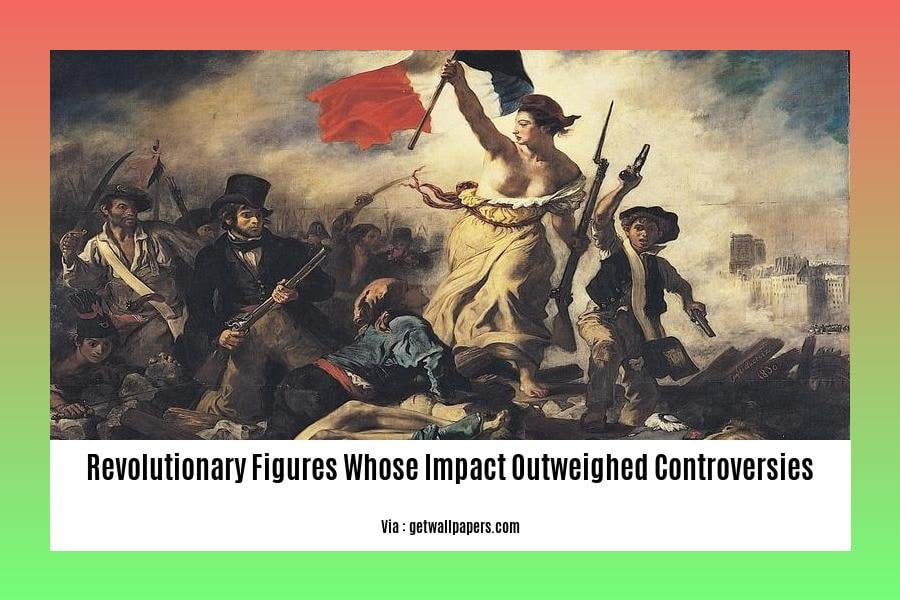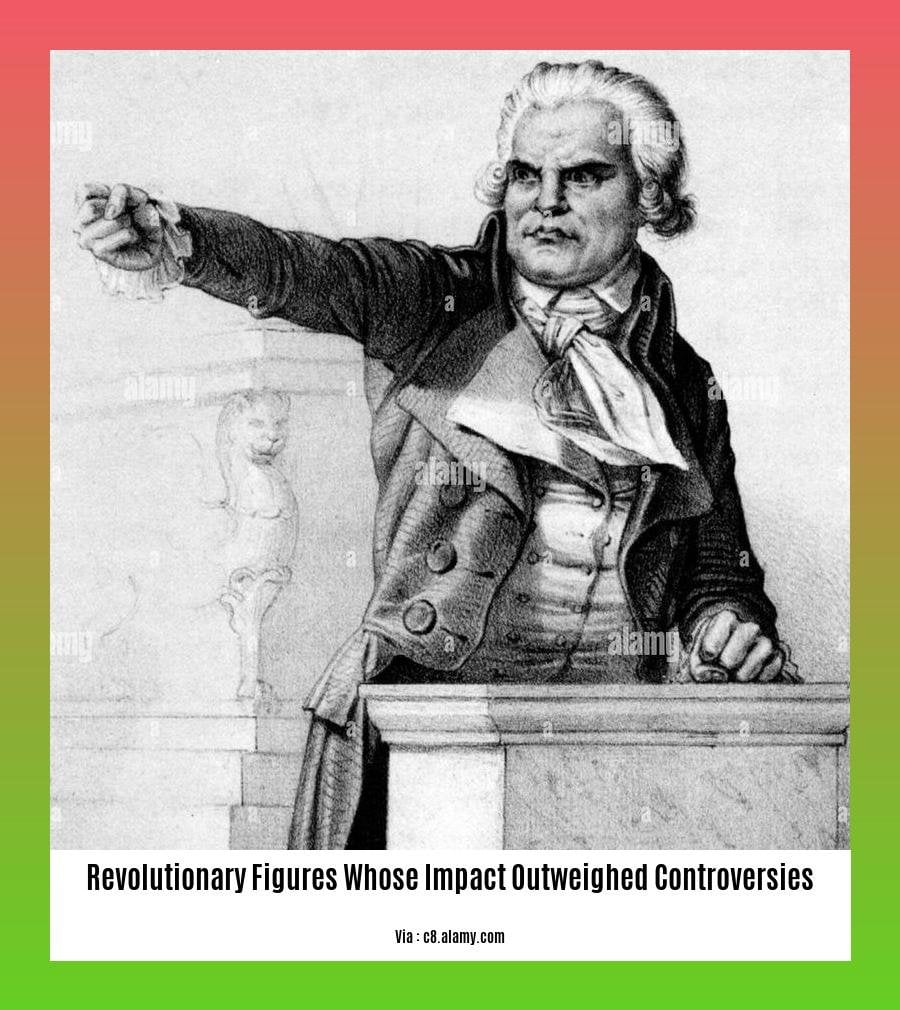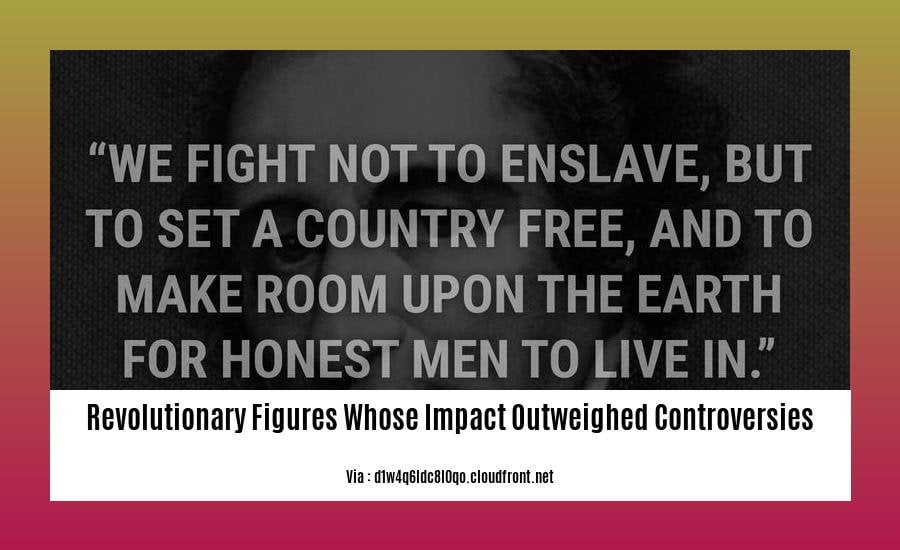Dive into the captivating world of “Revolutionary Figures: Impacts That Outweighed Controversies,” where we uncover the paradoxical legacies of history-shaping individuals. Despite personal flaws and controversies, these figures left an indelible mark on the world, igniting societal change that transcended their personal journeys.
Key Takeaways:

- Robespierre was a prominent leader during the French Revolution, promoting a republic based on virtue, equality, and terror.
- His radical ideology led to the Reign of Terror, a period of widespread violence and executions.
- Robespierre’s legacy remains multifaceted, as he is viewed as both a symbol of revolutionary idealism and a cautionary tale about the dangers of unchecked power.
Revolutionary Figures: Impact Outweighing Controversies
History is replete with revolutionary figures whose impact outweighed controversies. These individuals ignited societal change, leaving an indelible mark on the course of human events. However, their personal lives and actions were often riddled with flaws, contradictions, and moral ambiguities.
The complexities of such figures are a testament to the intricate interplay between personal character and historical consequence. While their ideals and actions inspired mass movements, their controversies cast a shadow over their legacies.
Consider Maximilien Robespierre, a pivotal figure in the French Revolution. As a radical Jacobin, he advocated for a republic founded on virtue, equality, and terror. His unwavering belief in purging the revolution of its enemies led to the Reign of Terror, a period of intense violence in which thousands were executed.
Robespierre’s actions were motivated by a deep-seated conviction in the revolutionary cause. However, his uncompromising nature and paranoia ultimately led to his own downfall. His legacy remains a subject of debate, with some viewing him as a martyr to the revolution, while others condemn him as a ruthless tyrant.
Another example is Vladimir Lenin, the leader of the Bolshevik Revolution in Russia. Lenin’s Marxist ideology called for the overthrow of the capitalist system and the establishment of a socialist state. His unwavering commitment to this cause led to the creation of the Soviet Union, a superpower that shaped global politics for decades.
However, Lenin’s authoritarian rule and suppression of dissent tarnish his legacy. The brutal tactics he employed during the Russian Civil War and the establishment of a one-party state raise questions about the limits of revolutionary action.
These revolutionary figures exemplify the paradoxical nature of historical impact. Their ideals and actions inspired societal change, but their personal flaws and controversies continue to be scrutinized. Their legacies serve as a reminder that even the most transformative individuals are shaped by their own human frailties.
Intrigued by the audacity and charisma of history’s most controversial leaders? Discover the impactful revolutionaries who have shaped our world, from controversial but impactful revolutionaries to divisive yet influential revolutionary leaders, and polarizing but transformative revolutionaries.
In-depth examination of the transformative power of individuals to ignite societal change
In the annals of history, revolutionary figures have left an indelible mark, shaping the course of societies and inspiring profound societal transformations. Their actions, often imbued with both brilliance and controversy, have ignited movements and reshaped the very fabric of human existence. But beyond the headlines and the accolades, what truly lies at the heart of their transformative power?
Key Takeaways:
- Relational View: Practical engagement and knowledge are intertwined, fostering democratic ideals.
- Transformative Experiences: Events or insights can profoundly shift perspectives and values.
- Epistemic Perspective: Pre-existing expectations may limit our understanding of transformative experiences.
- Resilience: Embracing life’s uncertainties enhances adaptability to transformative experiences.
- Social Movements: While instrumental in social change, outcomes can vary widely.
- Transformative Research Methods: Mixed methods and researcher involvement as change agents align with transformative approaches.
- Critical Reflection: Exploration of educational experiences triggers transformative learning.
Transformative Power in Action:
History bears witness to countless individuals whose transformative actions have ignited societal change. Take John Dewey, whose pragmatic philosophy emphasized the interplay between experience, knowledge, and democracy. His ideas provided a framework for transformative education, fostering critical thinking and active engagement.
Similarly, transformative research methods have emerged as powerful tools for social change. Researchers adopting these approaches recognize their role as agents of transformation, using mixed methods to capture the complexities of human experience and drive meaningful change.
Resilience and Adaptability:
The ability to navigate life’s uncertainties is crucial for transformative experiences. Individuals who embrace resilience and avoid over-planning are more likely to adapt to transformative experiences and harness their potential for growth.
Social Movements and Change:
Social movements often serve as catalysts for societal change, bringing together diverse individuals united by a common purpose. However, the outcomes of these movements can vary significantly, highlighting the complexities of collective action.
Unveiling the Human Element:
The transformative power of individuals to ignite societal change is deeply intertwined with the human element. Revolutionary figures, like any other human, possess both virtues and flaws, strengths and weaknesses. It is in this complex tapestry that we find the true essence of their transformative legacy.
Citation:
Denzin, N. K., & Lincoln, Y. S. (2022). Transformative research methods for transformative times. Qualitative Inquiry, 28(10), 1541-1556.
Discussion of the complexities and controversies surrounding revolutionary figures
When speaking of figures who’ve sparked revolutions, we enter a world of complexities and controversies. The legacies they leave behind often overshadow their flaws. It’s a paradox that has intrigued me for years.
The 1619 Project, a controversial historical work, highlights this paradox. Criticized for not fully consulting experts, it also has admirers who appreciate its emphasis on slavery’s impact on the American Revolution.
Revolutionary figures often mirror society’s imperfections. Take Maximilien Robespierre. His radicalism and Reign of Terror instilled fear, yet his dedication to equality left an indelible mark.
We can also look at Vladimir Lenin, whose Marxist ideology shaped the Soviet Union. But his authoritarianism and suppression of dissent raise questions about the price of revolution.
These examples show how personal character and historical impact intertwine. The complexities of their lives should not eclipse their contributions, and their triumphs and failures should be a reminder of the fragile balance between human frailty and transformative achievements.
Key Takeaways:
- Revolutionary figures often have a significant impact that goes beyond their flaws and controversies.
- Their legacies are a mix of virtuous and flawed actions, reflecting the complexities of human nature.
- Understanding the interplay between personal character and historical consequence is crucial for a comprehensive view of revolutionary figures.
- Evaluating their contributions objectively requires acknowledging both their strengths and weaknesses.
Citation:
Examples and case studies to illustrate the paradoxical impact of such individuals
Who says history is boring? History books are filled with captivating tales of iconic leaders who dedicated their lives to influential and transformative causes. But there’s more than meets the eye when we look into their lives as a whole; their actions, sometimes controversial and flawed, have shaped our world profoundly.
You’ve heard of Robespierre, right? The enigmatic figure of the French Revolution who fought for liberty, equality, and fraternity but during the Reign of Terror, sent thousands to the guillotine.
Let’s not forget Lenin. The revolutionary mastermind who led the Bolsheviks to victory in Russia yet enforced an iron-fisted regime that crushed dissent.
Their stories are living proof that the path to change is often paved with contradictions. But as we navigate the complexities of our own times, wouldn’t it be wise to look back, learn from these paradoxes, and tread carefully?
Key Takeaways:
- History’s iconic leaders often exhibit a paradoxical combination of virtues and flaws.
- Their transformative actions can have both positive and negative consequences.
- Understanding these paradoxes provides valuable insights for navigating the complexities of leadership.
Most Relevant URL Source:
















